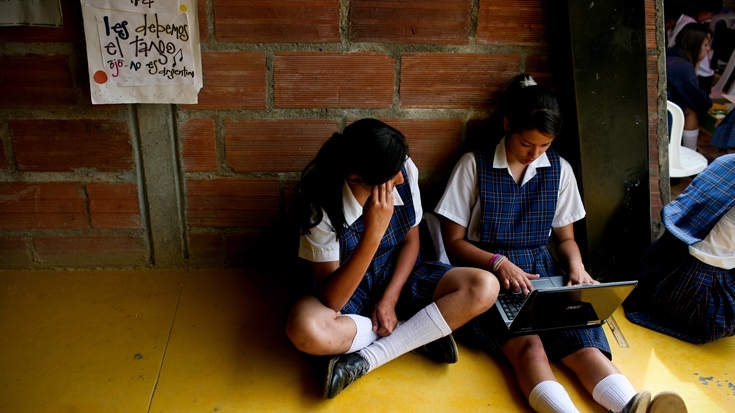A few months ago, Pamela, a 20-year-old from Mexico, dropped out of her last year of secondary school. She had too many absences due to family reasons and the school demanded that she study for eight more months in order to earn her degree.
In the end, she decided to drop out because of time and money issues. Today she works at a restaurant and has just completed a secondary school certificate. She says that since she left school, her opinion about education has changed. “Your ideas start to change and you make more of an effort to study, to move forward,” says Pamela. “After all, your family is not going to keep supporting you forever.”
Of every 100 students who enter primary school in Mexico, just 46 will complete upper secondary school. The graduation rate at this level in Mexico is 47%, below the Latin American average of 52%, and much lower than the average of 84% for OECD countries (the most developed in the world), according to a new World Bank study.
Over the past 20 years in Mexico, school dropout rates have practically disappeared in primary school and have declined 66% in secondary school, but just 30% in upper secondary school.
Less productivity
While the country has made significant advances in expanding basic education coverage (more than 95%), many young people still drop out of upper secondary school. This trend also occurs in the rest of Latin America –school dropout rates are highest in secondary school. On average, one of every three Latin American youths never even enrolls in secondary school.
Experts are concerned because the official age for attending upper secondary school – from 15 to 18 – coincides with a crucial phase of an individual’s development.
“Having a large number of adolescent dropouts has important consequences. Leaving school early limits the skills that the new generations are bringing to the labor market, which affects current productivity levels,” according to the World Bank's Raja Bentaouet Kattan, one of the authors of the study.
The consequences of not completing upper secondary school are not only academic, but also financial: if an individual does not complete this level, he cannot access higher education, which will negatively affect the salary he can earn.
It is estimated that a Mexican with a higher education earns 3.5 times more than an individual who only completed secondary school. Additionally, there are differences in access to formal employment: the formal sector of the Mexican economy employs 37% of Mexicans who did not complete upper secondary school and 50% of those who did.
Statistics also suggest that dropouts ages 15 to 18 face a greater risk of developing addictions in the future.
Lack of interest
“School dropout rates are higher in states with lower GDP per capita and higher levels of informality,” says Bentaouet Kattan, “which suggests that if the labor market does not offer opportunities for jobs with social benefits and other perks, there will be fewer incentives (for families) to continue to invest in education so that their children can complete secondary school.”
In Latin America, the leading reason for dropping out of school is youth’s lack of interest. According to a survey carried out in eight countries, and which is mentioned in the World Bank study, the main cause for dropping out (32.2 percent of respondents) is a lack of interest and the belief that schooling does not provide useful or quality elements.
The second reason is the economic situation – nearly 23% responded that it was the reason for leaving school. According to the survey, the third most common reason for dropping out was household obligations, pregnancy or child care whereas 14.5% of respondents left school because of work obligations.
In Mexico, 43% of respondents left school for educational reasons, according to the 2010 National Youth Survey. Nearly 36% reported that they dropped out for economic reasons whereas 8% said they did so for personal reasons, such as marriage or pregnancy.
A key factor in Mexico is the lack of satisfaction with secondary school education. In 2012, 42% of youth enrolled in secondary school said they believed that education was not helpful for finding a job.
What can be done?
“Based on the analysis, general recommendations are to continue to focus on secondary school education in Mexico, considering the challenge and what it entails,” says Bentaouet Kattan. Given that a variety of factors are associated with dropping out of school, he added that there is a need to adapt measures to each case since the problem is not the same in poor states as in states with higher income, for example.
According to Bentaouet Kattan, international experiences suggest that it is better to implement a mix of strategies, such as focusing on youth at risk with special, individualized attention; implementing different curricular strategies, such as exposing young people to higher education to encourage them to complete secondary school; and providing vocational training, among others.

